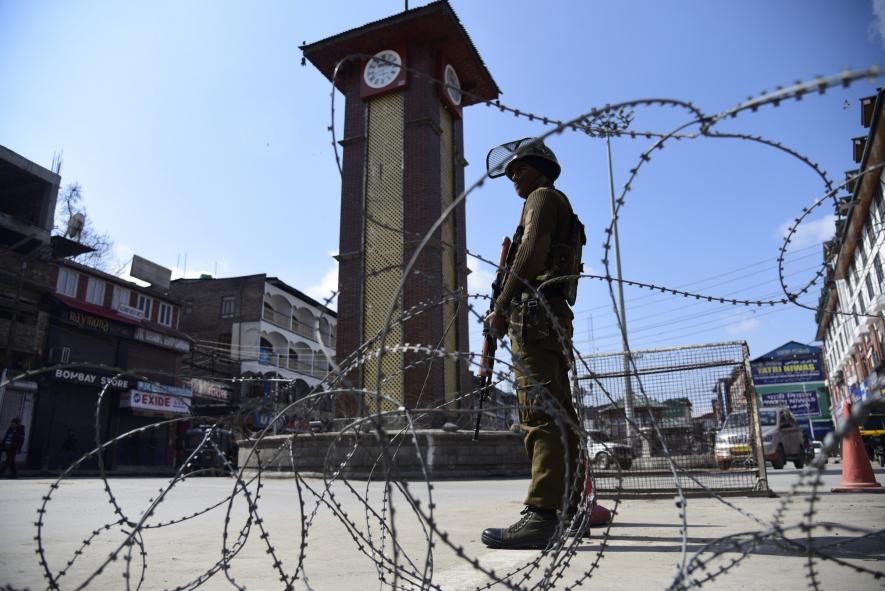Ban on Jamaat and Ordinance Reservations: What Does It Imply?

Deserted view of Lal Chowk. Image Courtesy: Zubair Sofi
On Tuesday, local life remained paralysed in Kashmir following the shutdown call given by joint traders’ association and transporters’ association over the ban on Jamaat-e-Islami outfit for five years and also the promulgation of Jammu and Kashmir Reservation (Amendment) Ordinance, 2019, by the President after the union cabinet headed by Prime Minister Narendra Modi approved it.
Business establishments including shops, private and government offices in the Valley were closed. The strike call was jointly given by the Kashmir Traders and Manufacturers’ Federation, Kashmir Economic Alliance (KEA), Kashmir Chamber of Commerce and Industry (KCC&I) and Kashmir Transporters’ Association on Monday.
In a statement, KCC&I on Monday termed the statement by the governor’s administration – that schools, mosques and orphanages have been kept out of the scope of the seizures and sealing – misleading. A spokesman of KCC&I said that the governor’s statement was surprising, as the the ban had been imposed by the Ministry of Home Affairs, and the state had only facilitated it. Any clarification required to be issued would ordinarily emanate from the central government.
The imposition of the ban has already been condemned by a majority of stakeholders in the state who view it as an attempt to subjugate the minorities with an eye on the forthcoming elections. It was pointed out that having arrested teachers, students, key organisational leaders of the Jamaat-e-Islami, sealed their properties including residential houses and frozen their bank accounts, it is impossible to expect the schools and orphanages controlled by the Jamaat-e-Islami to function.
Lawyers said that the J&K Bar Association finds the notification dated 28.02.2019, declaring Jamaat-i-Islami an unlawful association, is legally and constitutionally invalid because it is aimed at depriving the Kashmiri Muslim students of education, as their schools are run by Falah-i-Aam Trust. It also aims at curbing the peaceful religious activities of the organisation which is clearly an interference in the religious affairs of the Muslims of Kashmir. The meeting which lasted till 5 pm, remained inconclusive.
Reservation Issue
Meanwhile, there is opposition to the Ordinance on reservation which seeks to extend 3 per cent reservation in government jobs to families living along the International Border (IB). At present, such reservation was available only to the families living along the Actual Line of Control (ALoC). In addition, other orders were passed to extend 10 per cent reservation to the economically backward sections of all people irrespective of religion.
It is felt that this extension of reservation through a series of executive orders is another example of diluting the rights protected by Art 370 of the Constitution. People feel that it should not have been done at a time when the Supreme Court will be hearing the write petition challenging constitutional validity of Article 35-A of the Constitution.
Ordinance to amend J&K Reservation Act, 2004, and Constitution (Application to Jammu and Kashmir) Amendment Order, 2019, to amend the Constitution (Application to Jammu and Kashmir) Order, 1954, was purportedly done on the recommendations of State Administrative Council (SAC), which after the Presidential Proclamation dated 19.12.2018, has ceased to exist. Therefore, it could not have made any recommendation. It may be recalled that the state was put under President’s rule through this Proclamation.
Legal experts pointed out that currently, the President has assumed all the functions of the state, and all the powers vested or exercisable by the governor. The Governor is thus an “agent of the President of India” and an agent cannot make any kind of recommendations for issuing any Ordinance or order. It is also relevant to mention here that in terms of another notification issued by the President on 19.12.2018 itself, the Governor has to exercise only those powers granted to him subject to superintendence, direction and control of the President, making it further clear that the concurrence given by the Governor, in the instant case, is a concurrence from Caesar to Caesar’s wife.
The J&K High Court Bar Association, Srinagar, on March 1, 2019, in a day-long meeting held at High Court Complex, Srinagar, examined in great depth the ordinance as well as Constitutional Application Order, 2019 from the constitutional perspective. According to details provided by a member, they found that the Ordinance and the order issued is not what it purports to be, but in essence and substance, merely a cloak to extend to the State of J&K the constitutional amendments carried out in the Constitution of India by the Constitution (Seventy-seventh Amendment) Act, 1995, as well as the 103rd Amendment, affected to the Constitution of India, creating provision for reservations for economically backward members of the society. The Constitution of India does not, by its own force, apply to the State of J&K and its provisions can be extended only in accord with the mechanism constitutionally provided and prescribed under Article 370 of the Indian Constitution.
Given the constitutional mandate enshrined in Article 370, as regards, the application of the provisions of the Constitution of India to the state of J&K, as well as the constitutional authorities, designated thereunder and the dispensation at the helm of affairs in the state of J&K at present, the Ordinance issued by the central government, therefore, is clearly a fraud on the provisions of Article 370 of the Constitution of India and therefore unconstitutional, liable to be rolled back.
Meanwhile, the Aligarh Muslim University (AMU) Students’ Union has sought an “urgent review of the ban on Jamaat and demands to strengthen of democracy in the state by giving space to the voices of dissent”.
“Government must avoid measures like banishing that only feed anti-India sentiment in Kashmir. Governor of the state, Mr Satya Pal Malik must inform the Centre about the Kashmir’s response to the ban and make efforts to help in making peace in the state,” it said in a statement.
Get the latest reports & analysis with people's perspective on Protests, movements & deep analytical videos, discussions of the current affairs in your Telegram app. Subscribe to NewsClick's Telegram channel & get Real-Time updates on stories, as they get published on our website.
























